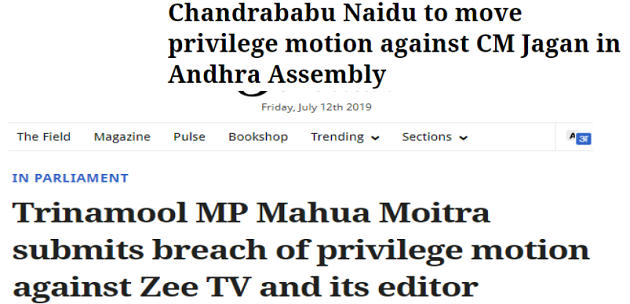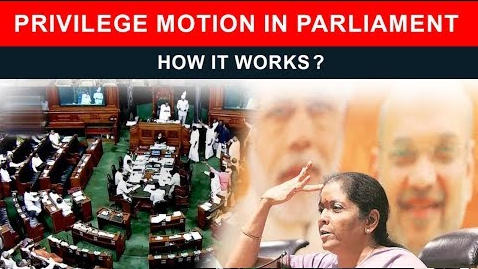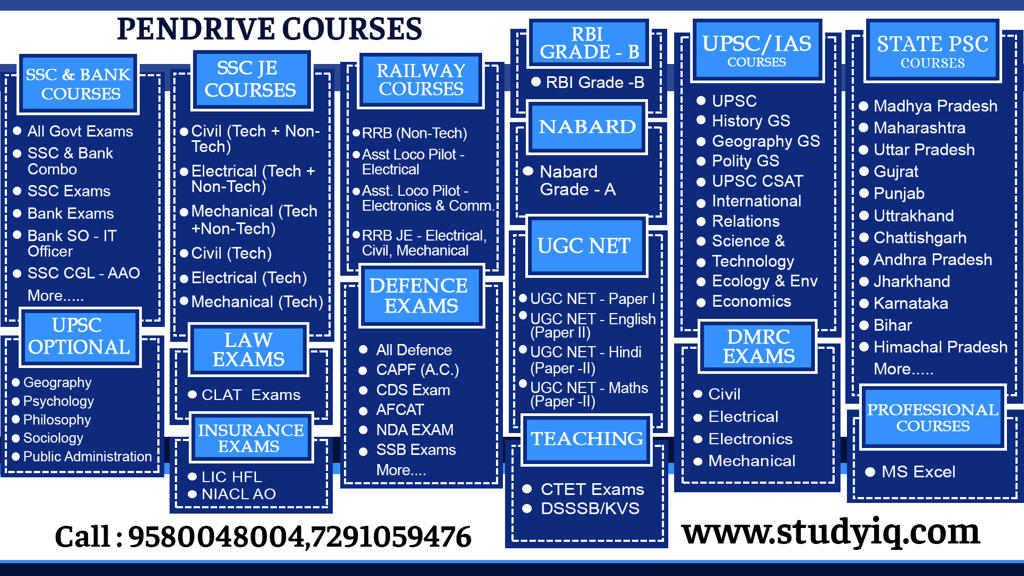Table of Contents

Q) Consider the following statements
- Privilege motion can be moved by any lawmaker or MP against anyone accused of breaching privileges.
- If a Privilege motion is moved by a member then the speaker/chairman has to accept it.
Which of the following statements is/are correct?
- A) Only 1
- B) Only 2
- C) Both 1 and 2
- D) Neither 1 nor 2
Q) What among the following is NOT true about the Public Accounts Committee?
- I. The committee was first set up in 1961.
- II. It’s main function is to audit the annual reports of Comptroller and Auditor General of India (CAG).
- III. It consists of 20 Lok Sabha members and 10 Rajya Sabha members.
- IV. The term of the office of the Public Accounts Committee is one year.
- Only 1 & 2
- Only 1 & 3
- Only 2 & 3
- Only 3 & 4
WHAT IS A PARLIAMENTARY PRIVILEGE?
- These are a set of rights, privileges and immunities provided to Parliament and Members of Parliament without which they cannot perform their functions efficiently and effectively.
- The objective of parliamentary privilege is to safeguard the freedom, the authority and the dignity of Parliament.
EVOLUTION OF PARLIAMENTARY PRIVILEGES IN INDIA
- Legislators in India did not enjoy any power or privileges till 1919.
- Whereas the members of the British House of Commons enjoyed privileges.
- Only in 1919, through an act, Freedom of Speech was allowed to Indian legislators.
- Thereafter the legislators started demanding the powers and privileges equivalent to those of House of Commons.
- Since the legislators in India had no punitive powers, the press kept on maligning them.
- The courts too interfered in the internal affairs of the legislatures, arresting them on various charges.
- The British govt. of India successfully resisted the demand.
- Ultimately the Indian legislatures got their due only when the country gained independence.

CONSTITUTIONAL PROVISION
- In Constitution, Article 105 mentions 2 privileges.
- Freedom of speech in Parliament and right of publication of its proceedings.
WHAT IS A BREACH OF PRIVILEGE?
- It is violation of any of the privileges of the Members of Parliament or Parliament itself.
- It is punishable under law of Parliament.
- For example- To make speeches or to print or publish False Statements reflecting on the character or proceedings of the House or its committees or on any member of the House.
WHO CAN MOVE IT?
- A notice is moved in the form of a motion by any member of either House against those being held guilty of breach of privilege.

RULES THAT GOVERN PRIVILEGE
- Rule No 222 in Chapter 20 of the Lok Sabha Rule Book.
- Rule 187 in Chapter 16 of the Rajya Sabha rulebook.
- A member may, with the consent of the Speaker or the Chairperson, raise a question involving a breach of privilege either of a member or of the House or of a committee thereof.
- Any notice should be relating to an incident of recent occurrence and should need the intervention of the House.
- Notices have to be given before 10 am to the Speaker or the Chairperson.
ROLE OF THE SPEAKER/RAJYA SABHA CHAIR
- It is a first level of scrutiny of a privilege motion.
- The Speaker/Chair can decide on the privilege motion himself or herself or refer it to the privileges committee of Parliament.
- If the Speaker/Chair gives consent under Rule 222, the member concerned is given an opportunity to make a short statement.
PRIVILEGES COMMITTEE
- The Speaker nominates a committee of privileges consisting of 15 members (RS- 10) as per respective party strengths.
- A report is then presented to the House for its consideration.
- The Speaker may permit a half-hour debate while considering the report.
- The Speaker may then pass final orders or direct that the report be tabled before the House.
- A resolution may then be moved relating to the breach of privilege that has to be unanimously passed.
CAN PRIVILEGE MOTIONS BE MOVED ONLY AGAINST PARLIAMENTARIANS?
- No, it can be moved against any individual or authority who has violated or disregarded any of the privileges or immunities enjoyed by Parliament or MPs.
HOW FREQUENTLY PRIVILEGE NOTICES ARE ACCEPTED?
- A large number of notices are rejected, with penal action recommended in only a few.
FAMOUS CASES

- The most significant case was in 1978 when Indira Gandhi, who had just won the Lok Sabha elections from Chikmaglur, was expelled from the House. Then home minister Charan Singh moved a resolution of breach of privilege against her following observations made by the Justice Shah Commission which probed excesses during the Emergency.

- Another case was expulsion of Subramanian Swamy from the Rajya Sabha in 1976. Swamy was charged with bringing disrepute to Parliament by his activities through interviews in foreign publications that were construed as anti-India propaganda.

- In 2003, the Tamil Nadu Legislative Assembly sentenced N Ram of The Hindu and several other journalists to imprisonment. In a scene that was captured by several cameras, many policemen in riot gear descended on the offices of The Hindu.
WAY FORWARD
- Such a wide parliamentary privilege is ill-suited to the Indian democratic setup.
- Even in the UK, where it evolved, Parliament has stopped invoking privilege to double down on such reports which merely defame the MPs.
- There is a need to codify these privileges to provide clarity on what exactly is forbidden speech.
- Such codification will allow courts to test the parliamentary privilege on the touchstone of fundamental rights.
- Dr B R Ambedkar in his speech in the Constituent Assembly hoped that Parliament would codify such privileges.
Q) Consider the following statements
- Privilege motion can be moved by any lawmaker or MP against anyone accused of breaching privileges.
- If a Privilege motion is moved by a member then the speaker/chairman has to accept it.
Which of the following statements is/are correct?
A) Only 1
B) Only 2
C) Both 1 and 2
D) Neither 1 nor 2
Q) What among the following is NOT true about the Public Accounts Committee?
- I. The committee was first set up in 1961.
- II. It’s main function is to audit the annual reports of Comptroller and Auditor General of India (CAG).
- III. It consists of 20 Lok Sabha members and 10 Rajya Sabha members.
- IV. The term of the office of the Public Accounts Committee is one year.
A) Only 1 & 2
B) Only 1 & 3
C) Only 2 & 3
D) Only 3 & 4
Latest Burning Issues | Free PDF






















 WhatsApp
WhatsApp